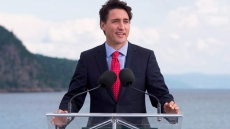A "limited selection" of next-generation cannabis products such as edibles will "gradually" hit retail shelves no earlier than mid-December 2019, Health Canada says.
The Ottawa-based agency on Friday released its final regulations governing these pot products, including topicals and extracts, and indicated the rules will come into force on Oct. 17 — exactly one year since the legalization of recreational cannabis in Canada.
However, Health Canada noted that after the law takes effect, federal cannabis licence holders must provide 60 days notice to the agency of their intent to sell new products.
That means that pot-infused brownies, beverages or lotions won't be available for legal sale until Dec. 17 at the earliest.
"As with any new regulatory framework, federally licensed processors will need time to become familiar with and prepare to comply with the new rules and to produce new products," Health Canada said in a statement.
"Provincially or territorially authorized distributors and retailers will also need time to purchase and obtain the new products and make them available for sale."
The final regulations, which will be formally published in the Canada Gazette on June 26, have been highly anticipated by pot industry players well as food, beverage and other consumer goods companies as they develop products to tap anticipated demand.
A flurry of companies have announced plans for weed-infused products. For example, Toronto-based Greenhouse Juice Co. said it plans to develop beverages infused with cannabidiol, or CBD, helped by an investment by Canopy Growth Corp.'s venture capital arm. Quebec-based Hexo Corp. has also partnered with alcohol giant Molson Coors to form a joint venture called Truss to make and sell cannabis-infused, non-alcoholic beverages.
A recent report by Deloitte estimated the Canadian market for these pot products is worth about $2.7 billion annually, with edibles contributing more than half of that amount. That's on top of the roughly $6-billion estimated domestic market the consultancy had already estimated for recreational and medical cannabis.
The major rollout of this next wave of pot products will likely happen further into 2020, said Jefferies analyst Ryan Tomkins in a note to clients before the government announcement.
"We are likely to only see the first products launched late into December... with regulators likely to review numerous details of proposals including testing, manufacturing and packaging procedures as well as product data and ingredient specifications."
Health Canada in February wrapped its public consultation on the draft rules for these additional cannabis products, and the final version is largely in line with what the agency had proposed.
As per the rules, edible cannabis, whether food or beverage, will have a cap of 10 milligrams of tetrahydrocannabinol — the high-inducing compound known as THC — per package. Cannabis extracts for inhalation or topicals, such as pot-infused lotions, will have a cap of 1,000 milligrams of THC per package.
These products cannot contain nicotine, caffeine or alcohol. As well, no elements on these products would associate them with alcoholic beverages, tobacco products, or vaping products.
All packaging must be plain and child resistant, and must not be appealing to young people.
Whether an edible cannabis product is reasonably considered to be appealing to kids would depend on various factors including its shape, colour, flavour, scent and how it is packaged, a government official said on a media briefing on Friday.
The determination of whether a product does violate the guideline will be made on a case-by-case basis, the official said.
These regulations "are the next step in our process to reduce the risks to public health and safety from edible cannabis, cannabis extracts and cannabis topicals and displace the illegal market for these products in Canada," said Ginette Petitpas Taylor, the federal health minister, in a statement.
Omar Khan, a vice-president with Hill and Knowlton Strategies who advises several clients in the cannabis industry, said there were few surprises in the final regulations.
Health Canada continues to take a cautious approach which focuses on harm reduction, he added.
However, "there needs to be room for legal brands to develop consumer loyalty if the illicit market is to be eliminated. This is something government needs to consider as the Cannabis Act regulations come up for review in a couple of years," Khan said.
